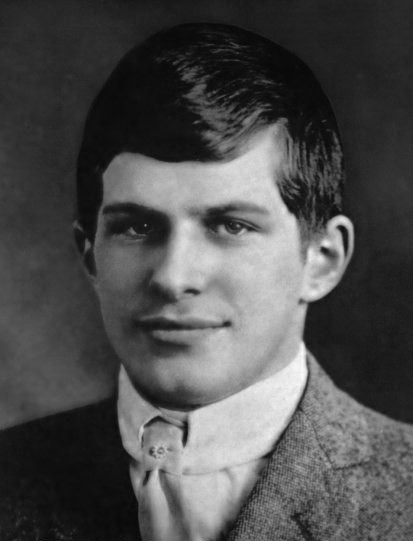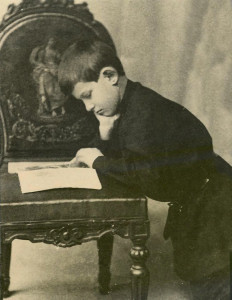The Unfortunate Life of a Child Prodigy with the Highest IQ of All Time
To this day, the tragedy of the life of a "super genius" of the century is still mentioned with pity and regret for the fate of a man who could have contributed to changing humanity with his talent.
 |
| William James Sidis was one of the most brilliant men of mankind. |
Boris Sidis and Sarah Sidis were a Russian-Jewish immigrant couple in New York City with outstanding intelligence. Boris was a psychologist famous for his achievements in hypnosis as well as his research on mental disorders. Boris was also a psychology professor at Harvard University. Sarah was a physician, the first woman of her time to earn a medical degree. The couple was extremely successful in their careers.
On April 1, 1898, Sarah gave birth to her first son and named him William James Sidis.
Boris or Sarah's genes alone would make a very smart child, but smarts aren't enough. They want a genius.
The prodigy of all prodigies
Therefore, from a young age William James Sidis received a harsh education from his parents.
William's education began when he was just a baby. His mother even gave up her career as a doctor to stay home and teach him. They used the family's savings to buy books, school supplies, and anything else necessary for his education.
Since then, he did not have a childhood like other normal children.
Using Boris’s creative psychological techniques, William was taught to recognize and pronounce the letters of the alphabet in just a few months. He babbled the word “door” at six months, followed by several other words over the next few months. By eight months, William was using a spoon.
At the age of two, William read the New York Times and wrote a letter on a typewriter in both English and French.
By the age of seven, he had learned seven languages: Greek, French, Russian, German, Hebrew, Turkish, Armenian, and Vendergood (a language William invented), and was following a high school curriculum. His parents had high expectations, they wanted the world to know who their son was and what they had done for him.
At the age of 9, William spoke at a space research conference at Harvard University. He was accepted to Harvard but was not admitted because his body size was "not suitable" for university.
Although not yet accepted by Harvard, William was accepted by Tufts University, where he spent most of his time correcting errors in mathematics books and studying Einstein's theories to find possible errors.
At the age of 11, he was admitted to Harvard University, becoming the youngest person in the school's history.
In 1910, in front of hundreds of professors and senior mathematics students at Harvard University, William (11 years old) gave his first public speech.
He spoke softly and somewhat shyly, embarrassed when he occasionally heard laughter from the audience below. However, his presentation on Four-Dimensional space left everyone stunned.
After this talk, then MIT professor Daniel Comstock told reporters that William would become the most important mathematician of the 20th century. And shortly thereafter, William's story became national news.
Misfortune follows misfortune
It was thought that life would smile on this talented young man, but the reality was completely different.
William graduated with honors at the age of 16. After graduating, William taught mathematics at Rice University in Houston, but his young age and popularity made teaching difficult.
William left after a short time and returned to Harvard University to study law but quickly dropped out when he realized it was not for him.
 |
| William had almost no normal childhood. |
In 1919, William once again became the subject of public discussion when he was arrested while participating in an anti-war march in Boston, which escalated into a riot.
Thanks to the influence of his parents, he escaped this prison sentence. However, he was kept under strict control by his parents afterwards, which caused him to feel depressed and dissatisfied.
Frustrated and frustrated, William moved from city to city, from job to job. He also frequently changed his name to avoid public scrutiny as well as his parents.
During this time, William also wrote a lot. There were works that were considered boring, but there were also great works about black holes, dark matter... while continuing to learn other languages.
But public opinion did not "let go" of William. The mocking and sarcastic articles about his "uselessness", "uselessness"... made him retreat deeper into the darkness, in pain and loneliness.
One summer day in July 1944, William's landlady found him unconscious in his small apartment in Boston.
He suffered a stroke. Death came to him at the age of 46, ending the life of the world's most intelligent but also unfortunate man.
Those who knew him later said that intelligence was extremely prominent in William, he was fluent in more than 40 languages in the world (including 1 language he created himself), but his tangible contributions to society were really too little compared to his talent.
Scientists estimate that his intelligence quotient (IQ) is around 300, while the average is 100, and the genius threshold is around 140. Although the legacy he left for the next generation is not really impressive, it can be affirmed that he is one of the most talented people of humanity.
According to Danviet
| RELATED NEWS |
|---|

